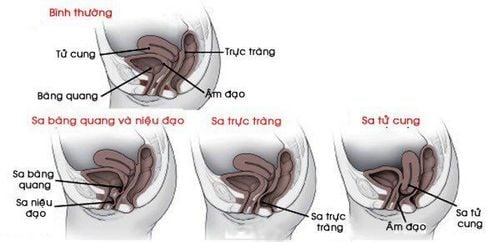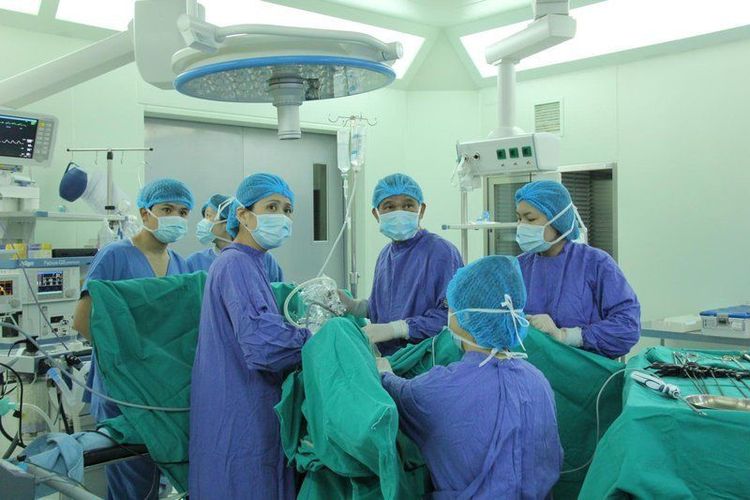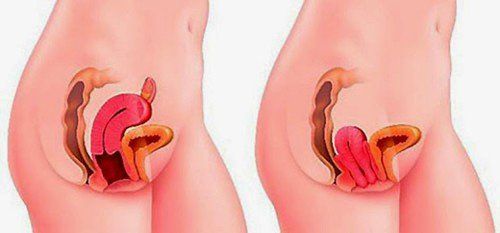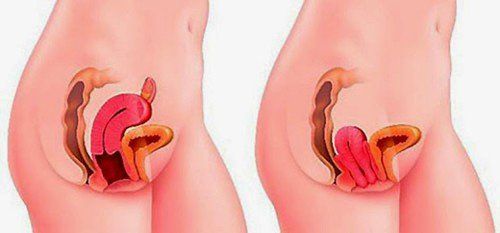This is an automatically translated article.
The article is professionally consulted by a doctor of Obstetrics and Gynecology, Vinmec Danang International General Hospital.Genital prolapse is a condition in which the bladder, uterus, or rectum prolapse into the vagina or, more severely, the cervix out of the vulva. This is not a life-threatening disease, but it greatly affects women's activities and work, especially problems in the husband and wife relationship.
1. What is genital prolapse?
Genital prolapse is often called uterine prolapse or uterine prolapse. But in reality, not only the uterus but often the bladder and rectum prolapse into the vagina. In severe cases, the upper organs can prolapse outside the vagina. Although the disease is not life-threatening, it greatly affects women's activities and work. Women often endure and hide their illness because of this difficult disease, so they have to face many difficulties in life, especially problems in marital relationships and urinary disorders that women encounter. such as incomplete urination or difficulty urinating.The uterus is an organ located deep in the abdomen. It is held in place by the muscle layer and the tissues of the perineum (the staging of the lower part of the pelvis), by the vaginal walls and by the ligaments in the abdomen and pelvis. If, for some reason, the organs that fix or hold the uterus are dilated, flaccid, and once intra-abdominal pressure increases (such as when breathing, pushing, coughing) and the weight of the uterus will push and pull. it gradually drops to cause genital prolapse with different severity and severity.
According to the results of the Ministry of Health, about 10% of Vietnamese women have genital prolapse after giving birth and most are in the age group of 40-60 years. Women who give birth a lot, give birth too early, do not receive safe and proper delivery techniques are susceptible to this disease. In particular, those with a history of prolonged labor and difficult delivery are more prone to genital prolapse and especially unsafe delivery, causing genital trauma. People who go to work too soon after giving birth are also at high risk of genital prolapse.
Women who work hard and hard are also susceptible to genital prolapse, especially female workers, farmers, manual laborers who have to work all day in a standing position, carrying heavy burdens Heavy lifting because the intra-abdominal pressure on the perineum is always high.
Genital prolapse can also occur in women who have not given birth due to weak body, thin ligaments, the uterus is in an intermediate position, so when there is strong pressure in the abdomen, it will push the uterus down gradually. In those who have given birth many times, the ligaments are weak, the perineum is torn or thin, under the increased pressure on the abdomen, the vaginal wall is prolapsed and the uterus is pulled along.

Sa sinh dục thường được gọi là sa dạ con hay sa tử cung.
2. Causes of genital prolapse
Causes of genital prolapse can be due to: premature delivery, thick delivery, improper delivery technique, early labor or heavy labor after childbirth, postnatal illness, malnutrition or lack of food all of the above causes. Both lead to a condition where the ligaments of the uterus and the muscles of the perineum are stretched thin, weakened or torn, not being able to hold the uterus in its original position. Therefore, when there is a movement that causes the pressure in the abdomen to increase, such as when coughing continuously, having to strain to defecate when constipated, ... will push the uterus down and out of the vagina.3. Manifestations of genital prolapse
Depending on each person, depending on the degree of genital prolapse more or less, new or long-term prolapse, simple prolapse or mixed lesions, accompanied by bladder or rectal prolapse, common signs appear the following: Discomfort, a feeling of heaviness in the chest area, in the lower abdomen, especially when standing, but when lying down, that uncomfortable feeling is gone. Sometimes there is a feeling of wanting to give birth because the veins in the perineum are congested, at the same time because the pressure in the abdominal wall pushing down on the perineum has weakened, or there is low back pain.Prolapsed mass in the vulva, perineal area, initially small in size, infrequently appearing, only appearing when doing heavy work or walking a lot, lying down, the mass recedes into the vagina or can push up on its own, later on, the sa mass gets bigger and bigger, sa often and can't push itself up anymore. At that time, there will be symptoms of heaviness in the lower abdomen, a feeling of entanglement and discomfort in the vulva-perineal area, affecting labor and daily activities.
If accompanied by bladder prolapse, there are signs of difficulty urinating, frequent urination, leakage of urine when laughing loudly, when coughing strongly or when shivering, often not urinating completely, so the bladder is easily inflamed causing painful urination. In case of prolapsed bladder, it is very difficult to urinate at first, must use fingers to push the bladder upward and inward to urinate. Sometimes patients have to go to the hospital because of acute urinary retention.
If accompanied by rectal prolapse, there will be a feeling that there is still no stool in the rectum, possibly constipation. Many people have genital prolapse but have normal periods and still be able to get pregnant. But these women are more likely to miscarry and give birth prematurely. Bleeding, discharge a lot due to cervical inflammation, rubbing makes it difficult for the patient to walk, limit labor,...

Hình ảnh sa sinh dục ở phụ nữ.
4. Treatment of genital prolapse
To treat genital prolapse, depending on the severity of the disease and the patient's subject, doctors will prescribe medical treatments (drugs, rehabilitation exercises...) or surgery. Medical treatment is often applied to patients with grade I II genital prolapse, or with elderly patients, chronic diseases or those who are not eligible for surgery. However, this method only helps the disease progress more slowly and does not improve significantly, with patients with genital prolapse from grade III onwards should perform early surgery so that the disease is not serious and remove difficulties. difficulties in daily life.
As before, to treat genital prolapse, the surgical method of vaginal hysterectomy, sewing to restore the anterior and posterior vaginal walls is often applied, but this method has the biggest disadvantage that is easy to relapse. In addition, women who have lost their uterus often cause low self-esteem and guilt.
Currently, with advanced treatment methods, at Vinmec International General Hospital, laparoscopic surgery has been applied to place a composite graft to lift the uterus and fix the bladder into the protruding muzzle. The biggest advantage of this laparoscopic surgery for genital prolapse is that there is almost no recurrence, the uterus is still preserved, and the accompanying symptoms of urinary incontinence are resolved.
Currently, laparoscopic surgery to place a composite graft to lift the uterus and fix the bladder into the protruding muzzle is evaluated as the method with the most advantages in the treatment of genital prolapse.

Phẫu thuật nội soi đặt mảnh ghép tổng hợp nâng tử cung và bàng quang cố định vào mõm nhô được đánh giá là có nhiều ưu điểm nhất.
5. Prevention of genital prolapse
For early prevention of genital prolapse, women should note the following:
Should give birth between the ages of 22 and 29. Because physiologically, this is the fertile period, the body parts are not yet mature. degraded, easy to recover. When giving birth, it is recommended to be served by qualified medical staff, not to prolong labor and have the perineal stitches if the birth is torn. After giving birth, you need to rest enough time for the muscles and ligaments in the perineum to contract again. No early employment before three months. Avoid continuous heavy labor or have to change positions to rest and relax when working in a standing position and walking too much. Eat well, exercise in moderation, exercise regularly to increase the flexibility of muscles in general and the muscles of the perineum (exercise light exercises or consult a doctor). . Through this article, we hope you have learned more about genital prolapse. When you see suspicious signs, you need to see a specialist immediately to be able to diagnose the disease and have timely treatment.
Please dial HOTLINE for more information or register for an appointment HERE. Download MyVinmec app to make appointments faster and to manage your bookings easily.













